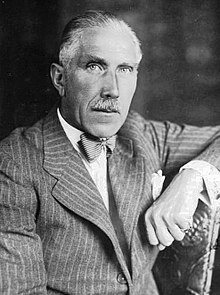
Back Marburgtalen Danish Marburger Rede German Discurso de Marburgo Spanish Discours de Marbourg French Marburgtalen NB Marburgtalet Swedish


The Marburg speech (German: Marburger Rede) was an address given by German Vice Chancellor Franz von Papen at the University of Marburg on 17 June 1934.[1] It is said to be the last speech made publicly, and on a high level, in Germany against National Socialism. It was done in favour of the old nationalist-militarist clique that had run Germany in the Kaiser's time, who had helped Hitler to power as a prelude to their return, only to find themselves instead pushed aside by the New Order.
Papen, encouraged by President Paul von Hindenburg, spoke out publicly about the excesses of the Nazi regime, whose ascent to power, 17 months earlier when Adolf Hitler became chancellor of Germany, had been greatly assisted by him. In his speech, Papen called for an end to rule by terror and the clamouring for a "second revolution" by the Sturmabteilung (SA – the NSDAP's storm troopers), and the restoration of some measure of civil liberties. He also stated: "The government [must be] mindful of the old maxim 'only weaklings suffer no criticism'".
The speech was drafted by one of Papen's close advisors, Edgar Julius Jung, with assistance from Papen's secretary Herbert von Bose and Erich Klausener. It was delivered in an auditorium in the "Alte Universität," one of the main buildings in the university, but there is no plaque or any other form of commemoration of the Papen speech which, while historically labelled as Germany's last public speech against National Socialism,[citation needed] does not contain the term "Nazi", which the Nazis considered to be a pejorative.
- ^ Anton Gill; An Honourable Defeat; A History of the German Resistance to Hitler; Heinemann; London; 1994; p.xiv
© MMXXIII Rich X Search. We shall prevail. All rights reserved. Rich X Search